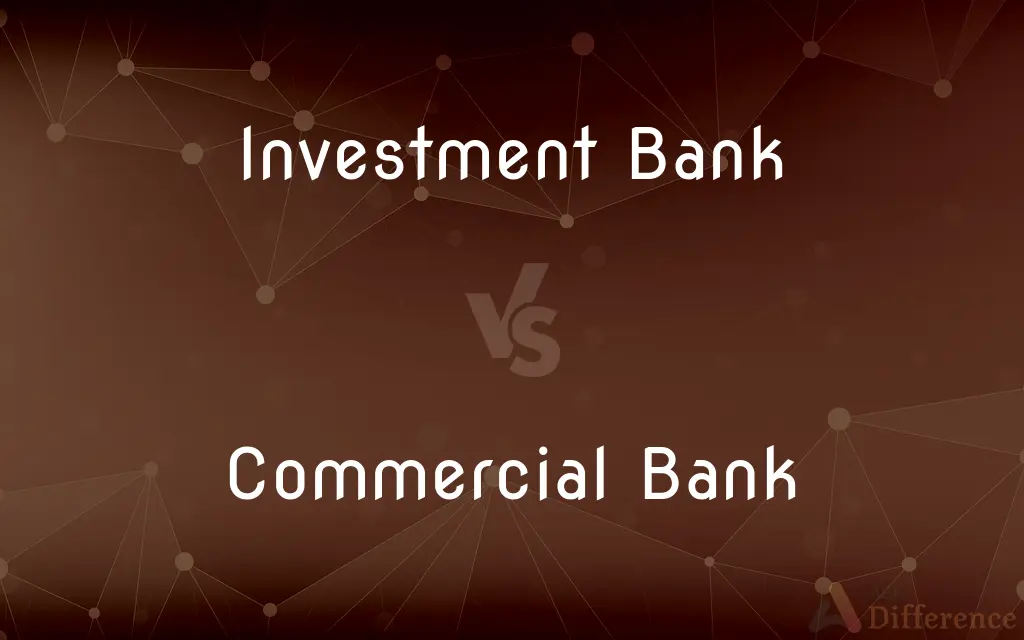Investment Bank vs. Commercial Bank — What's the Difference?
Edited by Tayyaba Rehman — By Fiza Rafique — Published on December 28, 2023
Investment Banks specialize in capital market services and advisory, while Commercial Banks provide regular banking services to the general public.

Difference Between Investment Bank and Commercial Bank
Table of Contents
ADVERTISEMENT
Key Differences
Investment Banks primarily assist corporations, governments, and institutions in raising capital. They provide services like underwriting, mergers and acquisitions, and trading of securities. In contrast, Commercial Banks cater to the general public, offering services like deposits, loans, and basic financial products.
The realm of Investment Banks is the world of high finance, dealing with larger sums of money and often involving intricate financial operations. On the other hand, Commercial Banks handle the everyday financial needs of individuals and businesses, ensuring smooth monetary transactions.
While Investment Banks focus on supporting businesses to grow, either by facilitating public offerings or by advising on mergers, Commercial Banks emphasize helping individuals manage their finances, granting loans, or offering savings accounts.
In the financial ecosystem, Investment Banks play a crucial role in connecting those needing capital with those having capital. Simultaneously, Commercial Banks act as a financial intermediary, mobilizing savings from the public and channeling them into various sectors through loans.
It's worth noting that both Investment Banks and Commercial Banks are pillars of the financial system, but they serve different core functions. The former is more about corporate finance, while the latter is centered on personal finance.
ADVERTISEMENT
Comparison Chart
Primary Function
Provides capital market services and advisory.
Offers regular banking services to the public.
Client Base
Corporations, governments, institutions.
Individuals, small businesses.
Key Services
Underwriting, M&A, trading securities.
Deposits, loans, checking accounts.
Revenue Sources
Fees for advisory, trading profits.
Interest spread between deposits and loans, service fees.
Level of Risk
Often assumes higher risks with financial products and advisory.
Relatively lower risk with traditional banking services.
Compare with Definitions
Investment Bank
An Investment Bank provides advisory services on mergers and acquisitions.
With the Investment Bank's guidance, the merger went smoothly.
Commercial Bank
A Commercial Bank provides financial products like credit cards.
The Commercial Bank introduced a new rewards credit card.
Investment Bank
An Investment Bank often engages in trading of securities.
The Investment Bank made substantial profits from its trading desk.
Commercial Bank
A Commercial Bank typically has physical branches for customer service.
She visited the Commercial Bank branch to discuss her mortgage options.
Investment Bank
An Investment Bank might underwrite securities to support businesses.
The tech firm sought the help of an Investment Bank for its bond issuance.
Commercial Bank
A Commercial Bank facilitates day-to-day monetary transactions.
He set up his paycheck's direct deposit with his Commercial Bank.
Investment Bank
An Investment Bank acts as an intermediary between issuers and investors.
The Investment Bank successfully connected the startup with eager investors.
Commercial Bank
A Commercial Bank offers deposit and loan services to the public.
I opened a savings account with the local Commercial Bank.
Investment Bank
An Investment Bank specializes in helping entities raise capital.
The company hired an Investment Bank to facilitate its initial public offering.
Commercial Bank
A Commercial Bank can offer a range of interest rates for savings and loans.
The Commercial Bank's competitive rates attracted many customers.
Common Curiosities
Do Investment Banks offer savings accounts?
Typically, no. Savings accounts are a service of Commercial Banks.
Can I get a mortgage from an Investment Bank?
Mortgages are generally provided by Commercial Banks, not Investment Banks.
What does an Investment Bank primarily do?
An Investment Bank assists in raising capital and provides advisory services for mergers and acquisitions.
What are the primary services of a Commercial Bank?
A Commercial Bank offers deposit, loan, and basic financial products to the general public.
Can an individual directly invest through an Investment Bank?
While Investment Banks primarily cater to institutions, high-net-worth individuals might also access certain services.
Do Commercial Banks deal with stock trading?
Typically, no. Stock trading and securities offerings are the realm of Investment Banks.
Do Investment Banks have physical branches like Commercial Banks?
Investment Banks usually don't have branches like Commercial Banks, operating instead from central offices.
Why would a company approach an Investment Bank?
A company might approach an Investment Bank to raise capital, get advisory on mergers, or go public.
How do Investment Banks earn their revenue?
Investment Banks earn through advisory fees, underwriting fees, and trading profits.
How do Commercial Banks generate profits?
Commercial Banks earn through the interest spread between deposits and loans and various service fees.
Can a Commercial Bank advise on mergers?
While primarily a service of Investment Banks, some large Commercial Banks might have divisions that offer such advisory.
Are my deposits safe in a Commercial Bank?
Deposits in a Commercial Bank are often insured up to a certain limit, ensuring their safety.
What's the main difference between an Investment Bank and Commercial Bank?
An Investment Bank focuses on capital markets and advisory, while a Commercial Bank provides traditional banking services to the public.
Is my money invested in the stock market when I deposit in a Commercial Bank?
No, Commercial Banks use deposits primarily for lending, not for direct stock market investments.
Can businesses open accounts with Commercial Banks?
Yes, businesses can open accounts and avail various services from Commercial Banks.
Share Your Discovery

Previous Comparison
Movement in Demand Curve vs. Shift in Demand Curve
Next Comparison
C5 Galaxy vs. C 17 GlobemasterAuthor Spotlight
Written by
Fiza RafiqueFiza Rafique is a skilled content writer at AskDifference.com, where she meticulously refines and enhances written pieces. Drawing from her vast editorial expertise, Fiza ensures clarity, accuracy, and precision in every article. Passionate about language, she continually seeks to elevate the quality of content for readers worldwide.
Edited by
Tayyaba RehmanTayyaba Rehman is a distinguished writer, currently serving as a primary contributor to askdifference.com. As a researcher in semantics and etymology, Tayyaba's passion for the complexity of languages and their distinctions has found a perfect home on the platform. Tayyaba delves into the intricacies of language, distinguishing between commonly confused words and phrases, thereby providing clarity for readers worldwide.













































